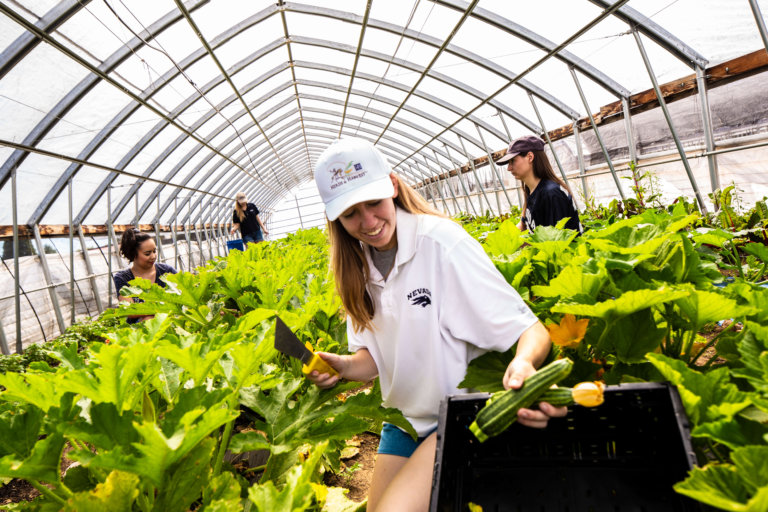
A degree in agriculture, biotechnology, natural resources and its related areas can be as cutting-edge, prestigious and impactful as any other STEM (that’s science, technology, engineering and mathematics) degree — especially those from top-tier, research-focused US universities.
These are the universities that empower students today to tackle climate change — an issue that has defined our generation according to the United Nations — as well as other global challenges such as food security and biodiversity loss. Technology is often a key feature at these institutions, where robotics, drones, GPS systems, sensors, and more are used. Research is just as pioneering and impactful, striving to innovate how food is grown, processed and distributed, protecting wildlife and water resources, and many more.
The following US universities are exemplary in these aspects:
University of Nevada, Reno

The College of Agriculture, Biotechnology & Natural Resources at the University of Nevada, Reno is guided by a student-centred, hands-on teaching philosophy. Source: University of Nevada, Reno
The University of Nevada, Reno‘s College of Agriculture, Biotechnology & Natural Resources has four departments and nearly 200 courses, ranging from veterinary and agricultural sciences to natural resources and biotechnology. Each prepares students for successful careers and to make meaningful contributions to society as engaged citizens and leaders in a complex world.
To do that, one needs a broad foundation, deep subject-area expertise and experience in the advancement of entire fields of knowledge. The college provides students with all three through its invaluable hands-on learning approach that includes undergraduate research opportunities and internships — all of which are fully supported by faculty and staff. They’re always available to provide mentoring and advising. It feels like a family here, where everyone gets individual attention but with the perks of a school that is diverse and large enough to provide many opportunities for research and other hands-on experiences.
The college makes full use of its location in the US’s driest state. It offers several programmes that showcase its commitment to drylands agriculture. A dual degree programme in agricultural science and economics blends agriculture with a powerful understanding of markets, trade, statistics, and solutions to resource allocation problems. The bachelor’s degree in rangeland ecology and management and bachelor’s degree in environmental science have been tailored to help students apply their knowledge to Nevada’s dry climate.
Meanwhile, the Bachelor of Science degree in Nutrition offers two specialisations: dietetics and nutritional science. Students can learn about the profession of dietetics from local practitioners, study in high-tech classrooms or pursue research. These programmes are accredited by the Accreditation Council for Education in Nutrition and Dietetics.
Graduate programmes are equally impactful. The university has MS and PhD programmes in Animal and Rangeland Science, Biochemistry, Natural Resources, Environmental Science, and Nutrition, and even an accelerated MS Biotechnology program — updated in line with industry needs and containing research opportunities to welcome every aspirant with an urge to create meaningful impact. If that sounds like you, click here to learn more.
University of Florida

Gainesville, Florida — where nature and culture meet — is home to the University of Florida School of Architecture. Source: University of Florida: School of Architecture
Florida is set for rapid growth that will take place within sensitive natural ecologies, fluctuating tourism, humid and hot climate, and extensive coastal hurricane threats, among others. It will face this as it becomes host to the third largest population in the US.
The School of Architecture at the University of Florida is in a unique position to respond to these challenges. It has, to its advantage, studio-based design methodologies in collaboration with a new generation of experts in engineering, ecology, business, anthropology, energy, fine arts, medicine and construction.
Leading it is a team of faculty members and students, who have garnered international, national, state and local design awards. They publish regularly and secure national, state and local grant funding for research-based service learning and design projects.
Enrolling in a Master of Architecture (M.Arch) here entails benefiting from the above features and more. Students will earn a professional degree accredited by the National Architectural Accrediting Board (NAAB), the educational credentials you need for licensure as a registered architect in the US, Canada, and Mexico. Study abroad opportunities to East Asia and Mexico are also available.
Three curricular tracks are offered for the first-professional NAAB-accredited Master of Architecture degree to cater to those with or without a pre-professional degree, as well as those with an accredited professional degree.
University of Colorado Boulder

The University of Colorado Boulder offers potential opportunities to fund your degree through teaching and research assistantships. Source: University of Colorado Boulder
The College of Engineering and Applied Science offers a BA or Post Baccalaureate degree in Computer Science; graduate degrees in Aerospace Engineering; Computer Science; Electrical Engineering; Engineering Management; Water Engineering & Management; and Computational Linguistics; amongst others.
The Master of Science in Technology, Cybersecurity and Policy is an ideal qualification for those seeking to capitalise on the 17,000 positions — of security-minded business and policy leaders to technical cybersecurity professionals — paying three times the national median salary to remain unfilled in Colorado. This programme trains students how to defend people, organisations and nations from adversaries, equipping them with the best methods, technologies and strategies to assess threats, mitigate vulnerabilities and understand complex systems and policies.
For those who seek a successful career in academia or research and development for the industry, the Master of Science in Computer Science is an ideal option. More than a pathway to PhD study, it’s a programme with many potential opportunities to fund your degree through teaching and research assistantships.
University of Iowa

Founded in 1847, University of Iowa is the state’s oldest institution of higher education and is located alongside the picturesque Iowa River in Iowa City. Source: University of Iowa/Facebook
Located alongside the picturesque Iowa River in Iowa City, the University of Iowa is one of America’s premier public research universities. It is ranked among the top 50 public universities, according to the US News and World Report rankings — an achievement that explains how scores of its graduates have crafted new chapters of exploration, discovery, creation, and engagement.
Environmental sciences programmes here provide rigorous training and use a comprehensive approach. Students can choose from four environmental tracks: biosciences, chemical sciences, geosciences, and hydrosciences — each programme contains hands-on field experience and students are strongly encouraged to study abroad.
Such experiences expand and enhance what they learn in classrooms — something boosted further still by how interdisciplinary majors here are. There are many ways to pursue supervised research with faculty members from the programme’s four sponsoring departments — biology, chemistry, geography, and geoscience — as well as participating faculty from chemical and biochemical engineering, anthropology, and civil and environmental engineering.
There is also an option to earn a second major or a minor outside of environmental sciences. On the other hand, the university’s interdisciplinary certificate programmes offer students a chance to upskill or enhance current knowledge.
*Some of the institutions featured in this article are commercial partners of Study International








